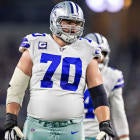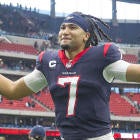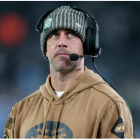Ezekiel Elliott did not wait for the ruling to come down from Harold Henderson on his appeal of a six-game suspension for violation of the domestic violence policy. The Cowboys running back has already sued the NFL, according to documents obtained by CBS Sports.
The NFLPA, with lawyer Jeffrey Kessler leading the way, filed a petition on behalf of Elliott asking the Eastern District Court of Texas to overturn any forthcoming suspension ruling from Henderson. Elliott was initially suspended six games on Aug. 11; his appeal hearing began this week and ran for three days. A ruling is expected either Friday or Monday at the latest and there was believed to be a "real chance" that the suspension was reduced multiple games.
The petition claims that Elliott's suspension, even after appeal, was a "product of a process that has already deprived the Union and Elliott of fundamental fairness," "one of the most fundamentally unfair arbitral processes conceivable" and part of a "League-orchestrated conspiracy by senior NFL executives ... to hide critical information."
Furthermore, the petition states that the "conspiracy" to "hide critical information" was designed to hide said information from Roger Goodell, his outside advisors on the Elliott discipline, the NFLPA and Elliott, the Dallas Cowboys and NFL fans.
The petition claims Elliott was not given a fair process when he was denied an opportunity to confront his accuser and additionally when the testimony of Roger Goodell was not compelled during the appeal hearing.
Elliott's lawsuit claims he was not allowed to look at the investigative notes from the NFL's interviews with the accuser.
Of particular note in the Elliott petition: Kessler and the attorneys claim that the "Elliott Report" (the document produced after almost a year of investigatory work) "deliberately omitted a conclusion" as to what sort of punishment the league should hand down for Elliott.
The petition claims that Kia Roberts, one of the lead investigators for the case, "would have had to reveal her conclusion, as an experienced lawyer and prosecutor, that there was not sufficient evidence to proceed with any discipline," had there been a conclusion included.
Put another way: the NFLPA believes that because Robert co-authored the report, her professional opinion that no punishment should be given to Elliott should have been included in the report. The union claims it was not.
The NFLPA also claims there was a document called the "Inconsistency Transcript" written by Roberts about the claims by Elliott's accuser, Tiffany Thompson, and that "someone at the NFL tried to cross out" that name for the document.
The ultimate goal of the lawsuit in the long term is to have the ruling and suspension vacated, but the short term effect here could be, as was the case for Tom Brady prior to the 2015 NFL season, the court granting Elliott an injunction to play football in Week 1.
If the court did that, Elliott would be immediately eligible to play and the six-game suspension -- or whatever new suspension Henderson hands down -- would be put on hold and go into effect if and when the court declined to vacate the award. It is possible, like with Brady, that the court waits until next offseason to hear the case. It is also possible that the court declines to even issue the injunction, pointing to the Brady case as an instance where the NFL's power to impose discipline was upheld.


















